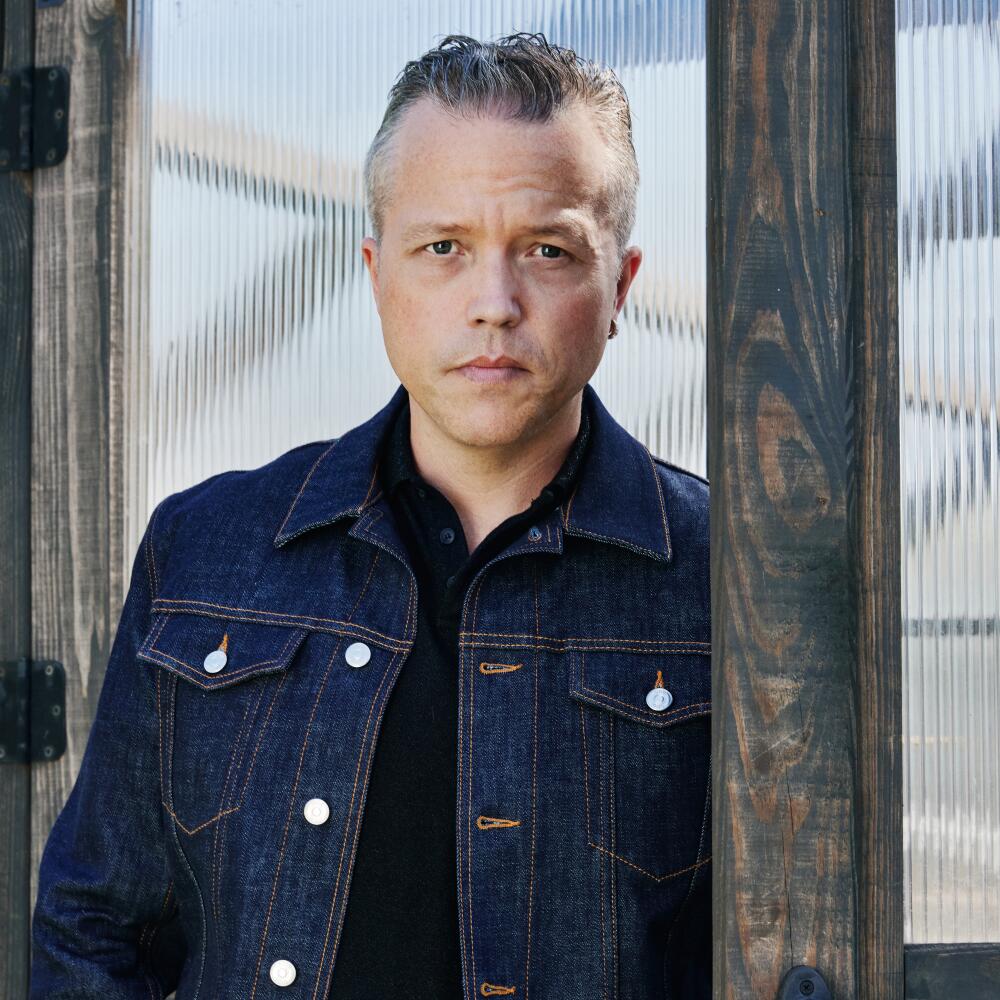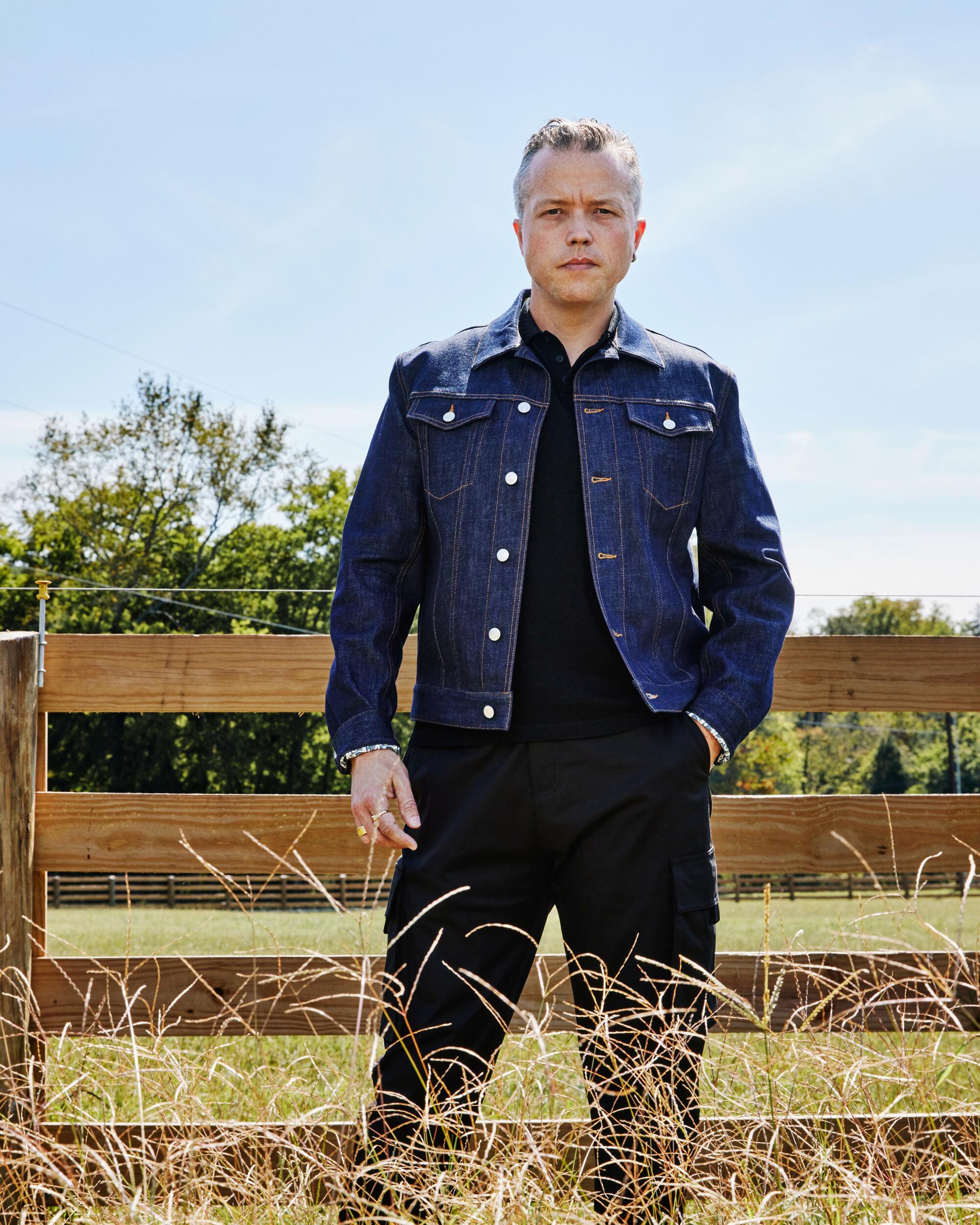
- Share via
Life is blooming everywhere on the Nashville-area farm where singer-songwriter Jason Isbell resides with his wife, the musician Amanda Shires, and their daughter Mercy: a garden of Monarch chrysalises about to hatch, a couple of fresh baby chicks, vegetables climbing their trellises. It’s so inviting to living things that at some point country star Chris Stapleton dumped a giant rooster here (“it was huge,” Shires says, popping by on the way to relieve Mercy from math class). It’s good to be surrounded by all this vibrancy, because Isbell thinks, and writes, a lot about death.
“I don’t go into it being like, ‘let’s write a song to show people how good it is that we die’,” Isbell, 44, says with a grin, sitting in his barn in a denim shirt and black jeans, his fingers adorned by chunky rings. He’s home for a three-hour stretch between tour stops, just enough time for a load of laundry. “But it is worth it for art to try to say, ‘We have a limited time, isn’t that beautiful?’”
Isbell’s talking about 2017’s “If We Were Vampires,” which won the Grammy for American roots song and examines love in the context of our inevitable demise. His latest LP, “Weathervanes,” released in June, exists on the same plane of thinking: Our impermanence makes life worth living, and no one is going to save us but ourselves. A strong contender in multiple Grammy categories, it finds him accounting for the harm we inflict on others and the world around us either by inaction, ignorance or arrogance — or just by a desire to make it through the day. And, in true Isbell style, there’s a lot of love in there too. Fragile, imperfect, fleeting love.
Since the release of his solo 2007 LP “Sirens of the Ditch” and catapulted by the success of his 2013 release “Southeastern,” the former Drive-By Truckers guitarist has established himself as one of the great working lyricists and consummate touring acts — alongside his stellar band, the 400 Unit — by culling detailed stories from personal experience and the Southern perspective, deconstructing the mythologies and poisoned nostalgia hung on the place he calls home. Born in Alabama and raising his family in Tennessee, his music is often labeled as country-adjacent by proxy: really, “Weathervanes” is a rock record for the modern era, made with the tools of the past but never moored by them.
‘Take It Like a Man,’ Shires’ acclaimed album about marriage and desire, follows her co-founding of the Highwomen and recordings with husband Jason Isbell.
“I resist the temptation to write something that is timeless,” he says, sipping a Liquid Death — Isbell is, famously, a recovering alcoholic. “And I don’t like throwback music. I don’t need to romanticize the past because that’s a shortcut. That’s not showing your work, you know? If I’m talking on a cellphone, I’m talking on a cellphone. I can’t make it a rotary.” Isbell’s songs connect, in part, because they are so urgently present. They worry about what we worry about. They love even when the world feels rotten, and they don’t always win. Because of it, his songs end up sounding like standards, covered, sometimes painfully, by hordes on Instagram and YouTube — even by Morgan Wallen, whose version of Isbell’s “Cover Me Up” sold over half a million units (when Wallen was caught on camera saying a racial slur, Isbell pledged his royalties to the NAACP).
Isbell is known for being open and upfront with his progressive political views — for leveraging his power as a musician and public persona for change — and he’s mastered the art of social media. Maybe it’s lost him some fans, but Isbell welcomes that.
“I like running off people who are closed-minded,” he says. “I’m not trying to sway them to one side politically, I’m just trying to tell them my story.” On “Weathervane’s” “Cast Iron Skillet,” Isbell tells the story of a white woman whose father stops speaking to her after she finds love with a Black man, and on “Save the World,” he charts his own fears navigating parenthood where school shootings are a commonplace occurrence. Then there’s “White Beretta,” reflecting on a partner who had an abortion when they were young, and his regret for how he handled it.
Isbell knows his fanbase is full of Southern listeners like himself, who also grew up reading the Bible and living their lives out of fear of sin. Changing your mind wasn’t something that was on the table: For many Americans glued to Fox News and the disinformation economy, it still isn’t. “Don’t ask questions, just believe it,” he sings on “Cast Iron Skillet.”
“There’s a reason it was the tree of knowledge that was the poison one,” he says. “Like, why wasn’t the tree of poison the poison one? Why wasn’t it the tree of herpes? They had to pick knowledge!”

For a while, he would strategically place songs like “White Man’s World,” where he accounts for his own privilege, next to crowd-pleasers like “Outfit” in the live set. The idea was that if you went to the bathroom during the former, you’d miss the latter. Isbell chuckles at the memory. “You’d see ‘em scrambling back to their seats,” Isbell says. His hope, though, is that more people than not will stick around through the discomfort to give their assumptions or biases a second thought.
“Jason opens doors for people, to let them see and understand the world in ways they would not have been able to without his songs,” says Gillian Welch, an artist whom Isbell proclaims is his favorite songwriter. “I think specificity is the key to universality, and Jason possesses that key.”
Isbell loves Welch so much in part because she makes the “authenticity argument” around country and roots musicians moot. To him, the only worthwhile definition of “authentic” is a good song, written from a place of truth. Anything else is pomp and circumstance.
Isbell isn’t surprised to see artists like Zach Bryan breaking records left and right as part of a recent country music wave at the top of the charts. “Of course it works,” Isbell says of Bryan’s grassroots, straight-to-the-people approach and folk sound. “It’s possible now, so it happens now. Us white males don’t need the gatekeepers we did 20, 30, 40 years ago. So, off we go! It’s that obvious.”
Isbell is more confounded when it comes to another country chart sensation: Oliver Anthony and his chart-topping “Rich Men North of Richmond.” “Buddy, there’s a reason you just don’t jump in the f— pool,” he says. “There’s something there. But that’s the song you should have written when you were 16, and then, when you were 19, you should have rewritten it without the part about hating people on welfare. And then when you are 20 you throw the whole thing out and write another song.”

That debate over who gets to be “real” and who doesn’t is a big part of what’s helped him keep a comfortable distance from the mainstream country music machine. He’s often asked to comment on the industry and its misgivings anyway, a role he shrugs at — he’s happy to fight for a more just place, but “[Music Row] and I have avoided each other in dressing rooms since the beginning of time.”
Soon, he will be seen as Bill Smith in the Martin Scorsese film “Killers of the Flower Moon,” and he returns to Nashville this month for his annual eight-night residency at the famed Ryman Auditorium. Isbell could easily play a night at an arena instead, but he prefers the smaller venue where he can invite a wide array of artists from across the race and gender spectrum to open for him, many of whom identify as queer, trans or nonbinary: this year, that list includes Izzy Heltai, Adeem the Artist and S.G. Goodman. Different people, different stories, another chance to get someone to change their mind for the first time.
“It’s important to me to create a place where people can enjoy themselves and not be afraid,” he says, as Mercy walks outside with a little black chick in her hand, showing it to her dad through the window. “That’s why we started making rock ‘n’ roll in the first place.”
More to Read
The biggest entertainment stories
Get our big stories about Hollywood, film, television, music, arts, culture and more right in your inbox as soon as they publish.
You may occasionally receive promotional content from the Los Angeles Times.











